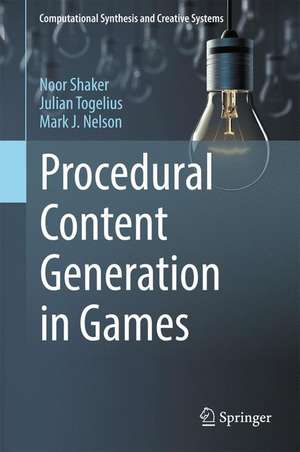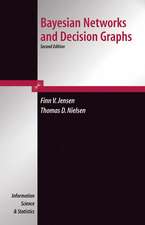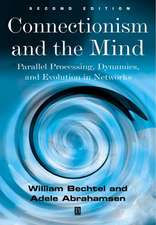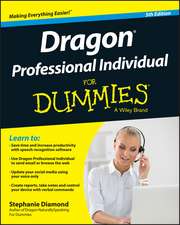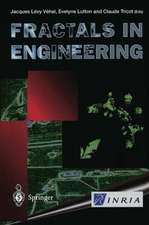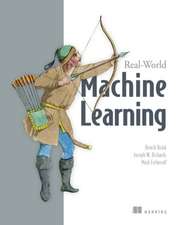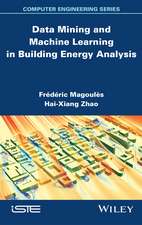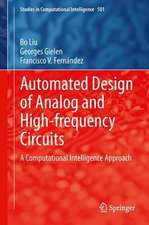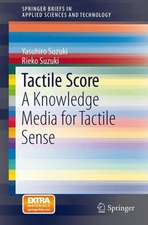Procedural Content Generation in Games: Computational Synthesis and Creative Systems
Autor Noor Shaker, Julian Togelius, Mark J. Nelsonen Limba Engleză Hardback – 26 oct 2016
The authors are active academic researchers and game developers, and the book is appropriate for undergraduate and graduate students of courses on games and creativity; game developers who want to learn new methods for content generation; and researchers in related areas of artificial intelligence and computational intelligence.
| Toate formatele și edițiile | Preț | Express |
|---|---|---|
| Paperback (1) | 333.72 lei 6-8 săpt. | |
| Springer International Publishing – 28 iun 2018 | 333.72 lei 6-8 săpt. | |
| Hardback (1) | 587.66 lei 6-8 săpt. | |
| Springer International Publishing – 26 oct 2016 | 587.66 lei 6-8 săpt. |
Preț: 587.66 lei
Preț vechi: 734.58 lei
-20% Nou
Puncte Express: 881
Preț estimativ în valută:
112.46€ • 116.98$ • 92.84£
112.46€ • 116.98$ • 92.84£
Carte tipărită la comandă
Livrare economică 14-28 aprilie
Preluare comenzi: 021 569.72.76
Specificații
ISBN-13: 9783319427140
ISBN-10: 3319427148
Pagini: 253
Ilustrații: XVI, 237 p. 103 illus., 57 illus. in color.
Dimensiuni: 155 x 235 x 21 mm
Greutate: 5.09 kg
Ediția:1st ed. 2016
Editura: Springer International Publishing
Colecția Springer
Seria Computational Synthesis and Creative Systems
Locul publicării:Cham, Switzerland
ISBN-10: 3319427148
Pagini: 253
Ilustrații: XVI, 237 p. 103 illus., 57 illus. in color.
Dimensiuni: 155 x 235 x 21 mm
Greutate: 5.09 kg
Ediția:1st ed. 2016
Editura: Springer International Publishing
Colecția Springer
Seria Computational Synthesis and Creative Systems
Locul publicării:Cham, Switzerland
Cuprins
Introduction.- The Search-Based Approach.- Constructive Generation Methods for Dungeons and Levels.- Fractals, Noise and Agents with Applications to Landscapes and Textures.- Grammars and L-Systems with Applications to Vegetation and Levels.- Rules and Mechanics.- Planning with Applications to Quests and Story.- ASP with Applications to Mazes and Levels.- Representations for Search-Based Methods.- The Experience-Driven Perspective.- Mixed-Initiative Approaches.- Evaluating Content Generators.
Notă biografică
Noor Shaker is a postdoctoral researcher in the Center for Applied Game Research in the Dept. of Architecture, Design and Media Technology of Aalborg University Copenhagen (AAU CPH). She was previously a postdoctoral researcher at the Center for Computer Games Research, IT University of Copenhagen. She is the chair of the IEEE CIS Task Force on Player Modeling. Her research interests include player modeling, procedural content generation, computational creativity, affective computing, and player behavior imitation.
Julian Togelius is an associate professor in the Dept. of Computer Science and Engineering of New York University, and a codirector of the NYU Game Innovation Lab. He was previously an Associate Professor at the Center for Computer Games Research, IT University of Copenhagen. He works on all aspects of computational intelligence and games and on selected topics in evolutionary computation and evolutionary reinforcement learning. His current main research directions involve search-based procedural content generation, game adaptation through player modelling, automatic game design, and fair and relevant benchmarking of game AI through competitions. He is a past chair of the IEEE CIS Technical Committee on Games, and an associate editor of the IEEE Trans. on Computational Intelligence and Games.
Mark J. Nelson is a senior research fellow at the MetaMakers Institute of Falmouth University, an institute dedicated to computational creativity and generative interactive entertainment. He was previously an Assistant Professor at the Center for Computer Games Research, IT University of Copenhagen. He works on AI-based design support for videogames (and other creative design domains), focusing on formalization of things such as game mechanics to enable automated analysis and generation. A long-time vision is an interactive, semiautomated CAD-style system for game prototyping. Prior to the IT University of Copenhagen,he was affiliated with the Expressive Intelligence Studio at the University of California, Santa Cruz, and the School of Interactive Computing at Georgia Institute of Technology.
Julian Togelius is an associate professor in the Dept. of Computer Science and Engineering of New York University, and a codirector of the NYU Game Innovation Lab. He was previously an Associate Professor at the Center for Computer Games Research, IT University of Copenhagen. He works on all aspects of computational intelligence and games and on selected topics in evolutionary computation and evolutionary reinforcement learning. His current main research directions involve search-based procedural content generation, game adaptation through player modelling, automatic game design, and fair and relevant benchmarking of game AI through competitions. He is a past chair of the IEEE CIS Technical Committee on Games, and an associate editor of the IEEE Trans. on Computational Intelligence and Games.
Mark J. Nelson is a senior research fellow at the MetaMakers Institute of Falmouth University, an institute dedicated to computational creativity and generative interactive entertainment. He was previously an Assistant Professor at the Center for Computer Games Research, IT University of Copenhagen. He works on AI-based design support for videogames (and other creative design domains), focusing on formalization of things such as game mechanics to enable automated analysis and generation. A long-time vision is an interactive, semiautomated CAD-style system for game prototyping. Prior to the IT University of Copenhagen,he was affiliated with the Expressive Intelligence Studio at the University of California, Santa Cruz, and the School of Interactive Computing at Georgia Institute of Technology.
Textul de pe ultima copertă
This book presents the most up-to-date coverage of procedural content generation (PCG) for games, specifically the procedural generation of levels, landscapes, items, rules, quests, or other types of content. Each chapter explains an algorithm type or domain, including fractal methods, grammar-based methods, search-based and evolutionary methods, constraint-based methods, and narrative, terrain, and dungeon generation.
The authors are active academic researchers and game developers, and the book is appropriate for undergraduate and graduate students of courses on games and creativity; game developers who want to learn new methods for content generation; and researchers in related areas of artificial intelligence and computational intelligence.
The authors are active academic researchers and game developers, and the book is appropriate for undergraduate and graduate students of courses on games and creativity; game developers who want to learn new methods for content generation; and researchers in related areas of artificial intelligence and computational intelligence.
Caracteristici
Procedural Content Generation (PCG) in games is the automatic or computer-assisted generation of content such as levels, landscapes, items, rules, and quests Content class- and industry-tested by leading game developers Hot topic in game development and development and academic game research Includes supplementary material: sn.pub/extras
